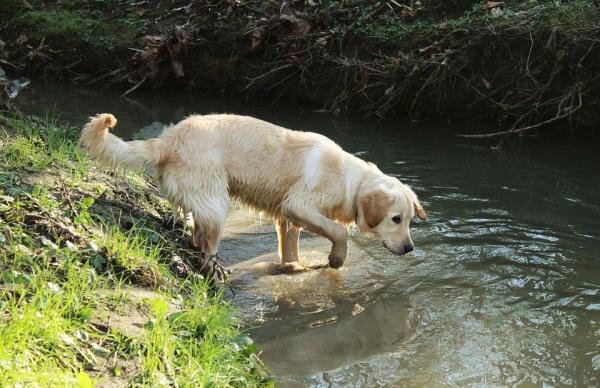My Dog Is Scared of Water



See files for Dogs
A dog's approach to water is as variable as our own. Some will bound in to any body of water with glee, others will only cautious approach a lapping wave and others still are acutely frightened of rivers, lakes and oceans. The reasons some dogs are scared of water and others not are also varied. Many factors contribute to this phobia, including genetics, experience and training. In the most extreme cases, some dogs have such a strong fear of water, they will not even allow us to bathe them at home.
In this AnimalWised article, we understand why my dog is scared of water. We help to understand the possible reasons behind aquaphobia, as well as provide some practical help for your dog to overcome it.
Reasons a dog is afraid of water
Some dogs have a natural predisposition towards water. For example, there is a classification of canine known as water dogs which have been bred since ancient times to help water workers. Many different types of seafarers and people who work on bodies of water have had the help of canines to rescue people, retrieve food, pass messages between vessels and many other tasks. Although many are now kept only as companion animals, you can see different types of water dogs still employed today.
Conversely, there are some breeds which may have a natural inclination to be wary of water. Many of these do so for good reason. Due to their morphology, some dogs are not naturally good swimmers. They might be a brachycephalic dog breed which makes breathing while swimming difficult or a dog with short limbs might find it difficult to paddle.
With this in mind, even dogs suitable for swimming can be scared of water. This is usually due to a psychological reason which is often related to experience. A puppy has a socialization period between 3 to 12 weeks of life. During this time, they will need to socialize with other dogs, animals and humans to learn how to interact in a healthy way.
Interaction with different environments is also an important part of socialization. This means the dog will need to become used to traffic, noises and certain natural phenomena such as water. For some dogs, they will intuitively love to interact with water. Others may need a little help, especially if confronted with waves or other intimidating bodies of water.
Although otherwise well socialized, some dogs may have had a negative experience with water which has led to their aquaphobia. In the following cases, these negative experiences may have led to a fear of water:
- Forcing a puppy to interact with water during the socialization period.
- Punishing a dog when interacting with water, leading to a negative association.
- Developing water-related diseases, such as otitis in dogs.
- Experiencing any kind of traumatic experience related to water.
- Painful physical illness that prevents them from bathing, often due to water insecurity.
- Elderly dogs that suffer from pain or instability may also cause water insecurity.
- Negative experiences while bathing which lead to negative associations.
Differences between fear of water and not liking water
Before we look at ways to help a dog lose their fear of water, we need to make an important distinction. There is a difference between a dog having a phobia of water and a dog simply preferring not to go in water. A dog which doesn't like water will simply not want to interact with it, similar to not wanting to play with a certain toy or not eat a certain food. A dog with aquaphobia will have an irrational fear of water and feel acute insecurity when near it.
When a dog is scared of anything, they will try to get away from it. In some cases, the fear may cause the dog to freeze or even become aggressive if they feel sufficiently threatened. To asses whether a dog has a phobia of water or simply does not like it, we need to consider the following:
- Observe their reaction at all times, taking into account calming signals of dogs. These are signs dogs make when they feel threatened and want to make the situation more secure.
- Play with them in a new area and then try to play with them at a safe distance from the water, but within their eyeline. If they stop responding to games, they are likely phobic. You can do the same with food by trying to give them something near the water. If they are too distracted to even eat, they are scared of it.
- When a dog is scared of something, they will likely require some time to recover from the sensation of dread. If you see your dog is panting, has a high heart rate or showing other signs they are scared once taken a way from the water, it is likely they have aquaphobia.
- If any dog has a disproportionate reaction to being around water, it means they likely have a fear of it. When a dog simply doesn't like water, they won't show anxiety or stress, they will simply be disinterested.
There are also other distinctions we need to make. For example, a dog may be scared of going into the sea or a lake, but have no problem wading through puddles or being bathed. In these cases, the dog may be afraid of large bodies of water, but in some cases, this is warranted. With an chronic phobia, the dog's general behavior may be affected. In this cases, they may even develop stereotypies and behavioral problems. When this occurs, it is imperative their fear is reduced.

How to stop a dog being scared of water
It is important to point out that fear cannot be removed immediately. Helping a dog get over a phobia takes time. We need to carry out controlled behavior modification sessions and redirect the fear. Positive reinforcement is essential and we should involve the help of a canine ethologist or educator where possible. However, there are some things you can do on your own which can help improve the well-being of a dog scared of water.
Things you must avoid:
- Uncontrolled exposure to water.
- Punishing your dog can make their behavior much worse. Remove any method of punishment, including choke collars or anti-bark collars.
- Forcing them to do something they do not want to do. The dog must advance in the treatment of his own free will, never by force.
- Reinforce behaviors such as crying, barking or biting. If we give positive reinforcement when a dog cries because they are scared of the water, it will validate these feelings instead of showing them there isn't anything to be scared of.
Things you can do:
- Be relaxed and reinforce our dog's sense of calm at all times when around water. Pet them and use a soothing and reassuring voice.
- Provide feelings of security. Remember that fear is an emotion, and emotions are not reinforced, only behaviors are reinforced.
- Identify the minimum distance at which your dog tolerates water without being nervous, tense or scared. It's important to know when to stop moving them closer and it's also helpful to know where you need to start.
- Sit at the appropriate distance and lay out some treats they like leading towards the water. Try to play games of all kinds that include food, be it a kong, intelligence games or similar.
- End the session after 5 minutes.
- Repeat this exercise frequently, always without forcing the dog and rewarding them when they voluntarily approach the water. Use positive reinforcement and gradually move closer to the water until they become more comfortable with it.
Ideally, the training should be carried out by a professional, but you can use these techniques to get them started.
How to bathe a dog which is scared of water
Helping a dog get over their fear of water has a practical element. Dogs do not need bathed all the time, but they will need to be washed when they are dirty. If you take a dog out in nature a lot, especially when it has been raining, you will know how dirty they can get. For this reason, you will need to use the above techniques to help your dog stop being scared of water. In addition, to bathe a dog scared of water you should also:
- Bring your dog into the bathroom and let them stay there for a few minutes before you start bathing. Given them some treats and reassure them.
- If you have a bath, fill up the bottom of the bath with a few inches of warm water. If you only have shower facilities, bring them into the shower and turn the water on gently, but do not put it on them. Use a non-slip mat to prevent them slipping and feeling unsure.
- Slowly, start to wet their coat. Ideally, you should have someone help you to do this. They can hold the dog and provide reassurance while you take care of the practical elements.
- Remove anything around the bath or shower which could fall in. The noises these falling objects make can cause the dog to jump.
- Bathe the dog as usual, but do so very slowly and always remain calm yourself. If you show fear, it will only encourage the dog to be scared.
- Reward the dog afterwards and continue being positive. This will help the dog to get used to the water and make the next time easier.
In some cases, a dog may be so phobic of water they will simply refuse to go anywhere near the bath. In these cases, you will need to take them to a professional groomer who should have the experience and ability to bathe a scared dog.

Difference between aquaphobia and hydrophobia
Although they are very similar, the terms ‘aquaphobia’ and ‘hydrophobia’ have a slight, but important difference. Aquaphobia refers to a dog which has an irrational fear of water, as described above. Hydrophobia is a similar fear of water, but it is also a symptom associated with rabies.
When a dog is infected with the rabies virus, they will undergo various changes. Eventually they will start foaming at the mouth, snap at the air and become aggressive. An early symptom of a rabies infection is an acute fear of water. If your dog is suddenly scared of water for no reason and they develop any symptoms of rabies in dogs, you will need to take them to a veterinarian immediately.

If you want to read similar articles to My Dog Is Scared of Water, we recommend you visit our Basic education category.







